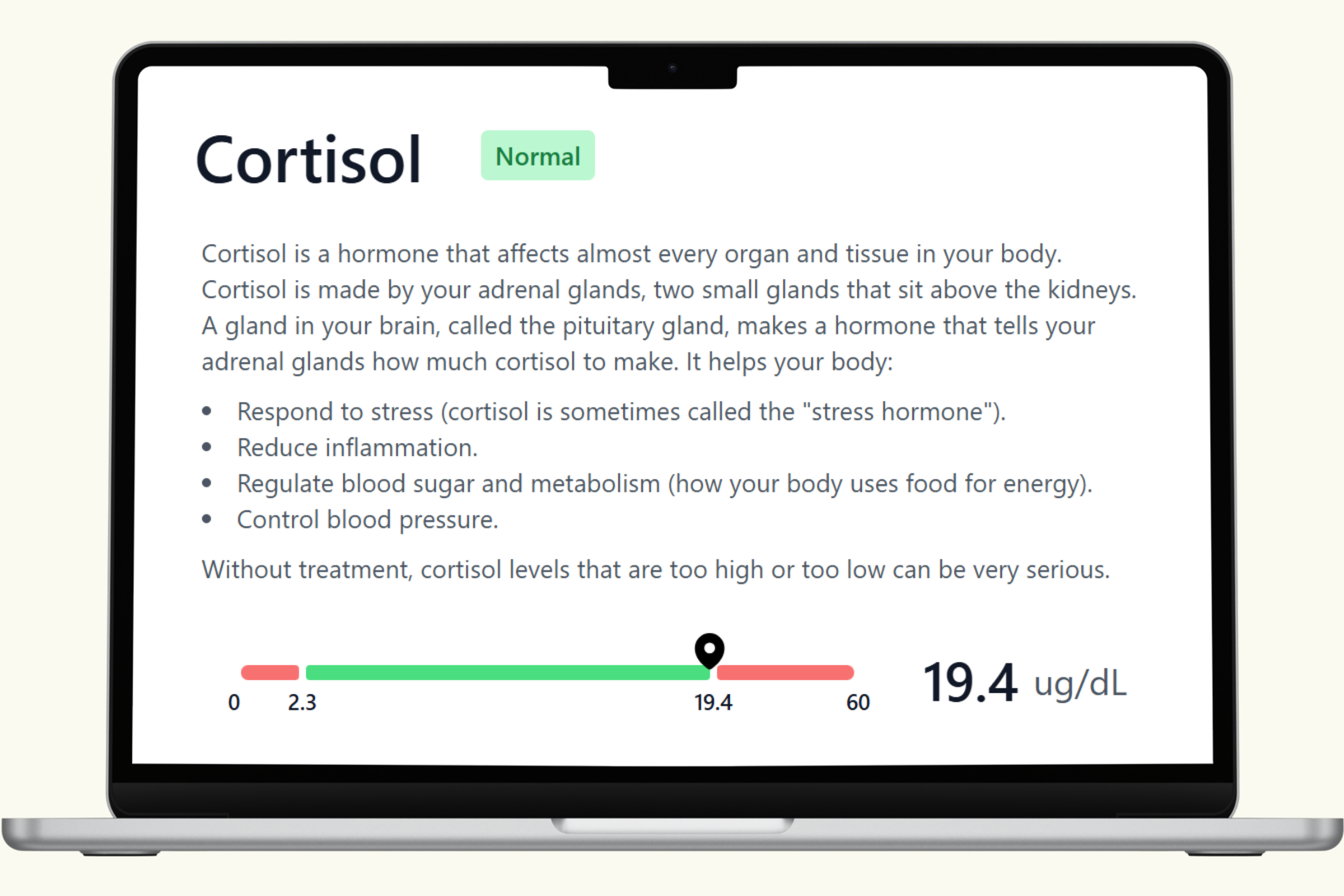Cortisol Blood Test: Understanding the Body’s Primary Stress Hormone
Cortisol is one of the most important hormones produced by the adrenal glands. Often called the “stress hormone,” it plays a central role in how the body responds to challenges, regulates energy, and maintains overall balance. While cortisol is essential for survival, chronically high or low levels can have wide-ranging effects on metabolism, immunity, mood, and long-term health.
The Cortisol Blood Test, included in the PlexusDx Men’s Health & Wellness Blood Test, allows men to measure their cortisol levels through a convenient at-home dried blood spot collection using an ADX card. This makes it easier to evaluate stress and adrenal health without the need for a clinic visit.
What is Cortisol?
Cortisol is a steroid hormone made in the adrenal glands in response to signals from the brain, specifically the hypothalamus and pituitary gland. It helps regulate the body’s “fight-or-flight” response by preparing the body for immediate energy demands. When activated, cortisol mobilizes stored glucose, increases alertness, and temporarily reduces functions that are not essential for short-term survival, such as digestion, growth, and aspects of immunity.
Beyond its role in stress response, cortisol also helps regulate metabolism, blood pressure, inflammation, and immune system balance. This makes it a critical hormone for day-to-day functioning, not just acute stress situations.
Why Cortisol Matters for Men
1. Stress Response and Adaptation
Cortisol is released during stressful events to help the body respond effectively. Short bursts can improve focus and energy, but chronic elevation can wear down physical and mental health.
2. Metabolism and Weight Balance
Cortisol regulates glucose metabolism by releasing stored sugar for quick energy. However, consistently high levels promote fat storage, particularly in the abdominal area, which is linked to insulin resistance and cardiovascular risk.
3. Blood Pressure and Circulation
Cortisol helps maintain blood pressure by balancing salt and water levels. Abnormal levels may contribute to hypertension or low blood pressure.
4. Immune System and Inflammation
Cortisol has anti-inflammatory effects and helps regulate immune activity. While short-term elevations reduce harmful inflammation, chronically high cortisol suppresses immunity, increasing vulnerability to infections and slowing wound healing.
5. Mood and Cognitive Function
Cortisol influences brain activity, including memory, focus, and mood regulation. Persistently high cortisol has been linked to anxiety, irritability, and depression, while very low levels can cause fatigue, poor focus, and low resilience to stress.
How Cortisol Levels Fluctuate
Cortisol follows a daily rhythm known as the diurnal cycle:
- Morning: Levels peak shortly after waking, helping the body prepare for the day with energy and alertness.
- Daytime: Levels gradually decline through the afternoon.
- Evening: Cortisol is at its lowest, allowing the body to rest and repair.
- Other triggers: Meals, exercise, or acute stress can temporarily raise cortisol levels at any time.
This natural rhythm helps regulate energy balance, sleep quality, and resilience to stress. Disruptions in this cycle can indicate adrenal fatigue, chronic stress, or other health concerns.
Reference Ranges for Cortisol in Men
Cortisol reference ranges depend on the time of day the sample is collected. Typical morning and evening values include:
- Morning (7–9 AM): 6 – 23 µg/dL
- Afternoon (3–5 PM): 2 – 14 µg/dL
- Functional/optimal morning range: 10 – 20 µg/dL
Functional medicine emphasizes evaluating cortisol within the context of daily rhythm, not just single values, since imbalance can exist even if one result falls within the conventional range.
What High Cortisol Can Mean
Elevated cortisol may indicate that the body is under chronic stress or that the adrenal glands are overactive. Common causes include:
- Chronic psychological stress
- Sleep deprivation
- Overtraining or physical strain
- Cushing’s syndrome (rare)
- Medications such as corticosteroids
Symptoms of high cortisol include weight gain (especially in the midsection), muscle loss, anxiety, high blood pressure, reduced immunity, and poor sleep quality.
What Low Cortisol Can Mean
Low cortisol levels may point to adrenal insufficiency or exhaustion of the stress response system. Possible causes include:
- Addison’s disease (adrenal failure)
- Pituitary dysfunction (low ACTH signaling)
- Chronic fatigue syndrome
- Long-term stress leading to adrenal dysregulation
Symptoms of low cortisol include extreme fatigue, weakness, low blood pressure, poor stress tolerance, dizziness, and difficulty recovering from illness.
Why You Should Get Your Cortisol Checked
Monitoring cortisol helps identify whether fatigue, weight changes, sleep disturbances, or mood issues are related to stress and adrenal health. Understanding your cortisol levels can help:
- Evaluate stress response and resilience
- Explain unexplained fatigue, weight gain, or anxiety
- Guide lifestyle strategies to balance stress hormones
- Support healthy metabolism, sleep, and immune function
With the PlexusDx Men’s Health & Wellness Blood Test, cortisol is measured alongside DHEA-S and other key hormones, providing a comprehensive picture of adrenal and overall health.
Conclusion
Cortisol is a vital hormone that supports energy, metabolism, and stress response. While essential in the right amounts, both high and low cortisol can negatively impact health, contributing to fatigue, weight changes, mood disturbances, and immune dysfunction.
The Cortisol Blood Test, included in the PlexusDx Men’s Health & Wellness Blood Test, provides an easy at-home way to monitor adrenal health and stress balance, empowering men to take control of their energy, performance, and long-term well-being.

Share:
DHEA-S Blood Test
Free T3 Blood Test